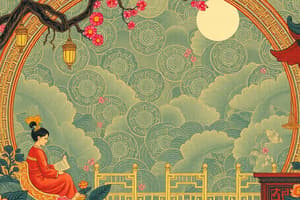Podcast
Questions and Answers
What was one significant result of Mongol rule on Chinese society during the Yuan Dynasty?
What was one significant result of Mongol rule on Chinese society during the Yuan Dynasty?
- Enhanced stability and trade across Asia (correct)
- Return to a purely nomadic lifestyle
- Diminished military power of China
- Increased isolation from other cultures
Genghis Khan was known for using fear as a military strategy.
Genghis Khan was known for using fear as a military strategy.
True (A)
What were some innovations that reached Europe during the Mongol rule?
What were some innovations that reached Europe during the Mongol rule?
Gunpowder and other goods.
The __________ plague, speculated to be spread by the Mongols, devastated Europe in the 1300s.
The __________ plague, speculated to be spread by the Mongols, devastated Europe in the 1300s.
Match the following terms with their correct descriptions:
Match the following terms with their correct descriptions:
What title did Kublai Khan assume in 1260?
What title did Kublai Khan assume in 1260?
Kublai Khan ruled over the entire Mongol Empire without any division.
Kublai Khan ruled over the entire Mongol Empire without any division.
What was a significant impact of Mongol rule on Chinese society?
What was a significant impact of Mongol rule on Chinese society?
The Mongol Empire was divided into different _______.
The Mongol Empire was divided into different _______.
Match the following terms related to the Mongol Empire with their descriptions:
Match the following terms related to the Mongol Empire with their descriptions:
Flashcards
pastoralist
pastoralist
A person who herds animals.
Genghis Khan
Genghis Khan
A powerful Mongol leader who united the Mongols and created a vast empire.
Pax Mongolica
Pax Mongolica
A period of peace and stability across Asia under Mongol rule.
Bubonic Plague
Bubonic Plague
Signup and view all the flashcards
Mongol Empire
Mongol Empire
Signup and view all the flashcards
Kublai Khan
Kublai Khan
Signup and view all the flashcards
Mongol Empire's Khanates
Mongol Empire's Khanates
Signup and view all the flashcards
Cultural Interaction (Mongols)
Cultural Interaction (Mongols)
Signup and view all the flashcards
Mongol Empire Splits
Mongol Empire Splits
Signup and view all the flashcards
Genghis Khan's death (Impact)
Genghis Khan's death (Impact)
Signup and view all the flashcards
Study Notes
Empires in East Asia, 600-1350
- Buddhism spread from China to Japan and across Southeast Asia.
- The Tang Dynasty made China a powerful empire.
- The Mongols later built a massive empire.
- The Great Wall was built along China's northern border to protect it from invaders.
- Chinese culture influenced Korea, Japan, and other parts of mainland Southeast Asia.
- Nomadic and settled peoples interacted through the expansions of different Empires.
- China exerted significant cultural and political influence over East Asia.
Tang and Song China
- The Sui Dynasty united northern and southern China.
- The Grand Canal connected the Huang He and Chang Jiang rivers.
- The Tang Dynasty was a period of prosperity and technological innovation.
- Tang Taizong was a powerful emperor who expanded China's borders.
- Empress Wu Zhao was a notable ruler who held real power during the Tang Dynasty.
- The Tang Dynasty eventually declined due to heavy taxation, military expansion, and rebellions.
- The Song Dynasty experienced a golden age, though a smaller empire in comparison to the Tang Dynasty.
The Mongol Empire
- The Mongols were a nomadic group from the steppe.
- Genghis Khan unified the Mongols and created a powerful empire.
- The Mongols conquered a vast territory from China to Eastern Europe.
- The Mongol Empire's size made it the largest unified land empire.
- The Mongol Empire facilitated trade and cultural exchange.
- The Mongol Empire eventually declined due to internal conflicts and rebellions.
- Kublai Khan established the Yuan Dynasty in China.
Feudal Powers in Japan
- Japan borrowed heavily from Chinese culture.
- Shinto is an important Japanese religion.
- The Yamato clan established the Japanese imperial system.
- Feudalism developed as a result of powerful landowners.
- Powerful clans and landowners challenged centralized authority.
- The Heian period saw the rise of a refined court society.
- Samurai warriors rose to prominence.
Kingdoms of Southeast Asia and Korea
- Southeast Asian kingdoms were influenced by China and India.
- The Khmer Empire flourished in Cambodia.
- Angkor Wat is a major architectural achievement of the Khmer Empire.
- The Sailendra Dynasty ruled on the Indonesian island of Java.
- Buddhist and Hindu missionaries influenced Southeast Asia.
- The Koryu Dynasty was modeled after China's government.
Studying That Suits You
Use AI to generate personalized quizzes and flashcards to suit your learning preferences.




